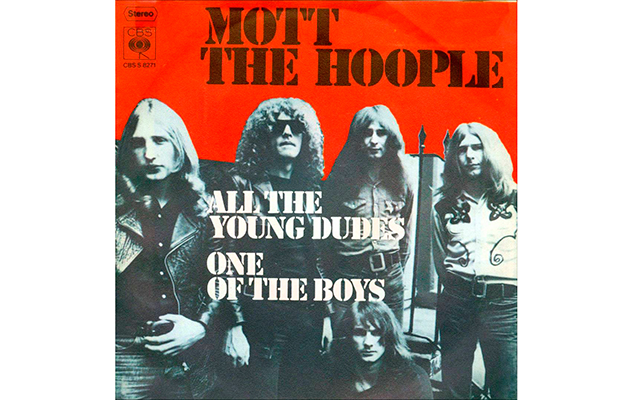The story behind Mott’s classic hit, this originally ran in Uncut’s January 2008 issue (Take 128).
________
One of glam’s stellar moments – a joyous, mood-defining, lighter-waving anthem – 1972’s “All The Young Dudes” was both the making and breaking of Mott The Hoople. Since 1969, the band had stuggled under the aegis of producer/svengali Guy Srevens, who put Mott together from the ashes of Hereford blues-rockers The Shakedown Sound. He re-christened them (taking their name from a Willard Manus novel) and brought Ian Hunter on board as lead singer. But over three years and three albums, Stevens had failed to translate Mott’s passionate live following into record sales and, in March 1972, following a fight onstage in Zurich, the band called it quits.
Just days later, when bassist Pete “Overend” Watts turned up for an audition for David Bowie’s band, the hottest property in rock (and something of a fan) was moved to resuscitate Mott’s fortunes. He gifted them the brilliant “… Dudes” and even hooked them up with his Mainman management and a new deal with CBS.
Bowie’s intervention did the trick. “… Dudes” was a monster hit, peaking at No 3 in the UK that autumn and breaking the band in the States. But with new-found success, old tensions returned. Follow-up singles like “All The Way From Memphis” (and tracks like “Hymn For The Dudes”) mined the themes of Mott’s long struggle for a breakthrough and established Hunter as Mott’s main songwriter – which prompted keyboard player Verden Allen and guitarist Mick Ralphs to quit.
By late 1974 it was all over: Hunter published his tell-all memoir, Diary Of A Rock’n’Roll Star, and although Mick Ronson bolstered Mott briefly, soon both had quit to form the Hunter Ronson Band. The remaining members soldiered on, but Mott’s moment had passed – rock’s textbook case of a slow rise and rapid fall.
IAN HUNTER [vocals]
We did split up in 1972, in Switzerland. We were at the bottom of the ladder playing in a converted gas tank and we didn’t see the point any more. Coming back from Switzerland, we were all great mates again because the pressure was off. Pete Watts went to audition for Bowie and David’s like: “What are you doing here? Looking for a gig? You can’t do that, you’re Mott The Hoople, you’re great.” I’d never met Bowie; I’d seen him once doing the performance art thing, in about 1965. I knew he was great but I didn’t like what he was doing. But the women lined up after his show, it was obvious the guy had something.
Bowie offered us “Suffragette City” first, which I liked but I knew it wouldn’t get on radio. Radio was closed to us, so I knew we needed something special. I thought it would be something like “You Really Got Me” [Mott had previously covered The Kinks classic] that was more how we were. But when he played “… Dudes”, I could see how we could go to town and really do a number on it. I’m a peculiar singer but I knew that I could nail it.
I wondered why he was giving it to us. Ronson told me later that he’d done it himself and he wasn’t too happy with it. At the time, he told us that he’d written it specially for us, but that turned out not to be the case.
David was saying, it’s a bit boring at the end, it needs something else. We’d done a gig at the Rainbow the night before and I emptied a bottle of beer over a heckler and did the rap that I put on the end of the song.
Now when Bowie does it he puts the rap on, I don’t do it anymore. The song made us instant gays; we were tranny magnets when we played the US. Touring with Bette Midler probably helped add to that reputation. At first I was scared to go into gay bars but it was fabulous, people loved us there, we had some great hilarious times.
A lot of the old fans didn’t like it when we had the hit – it was like their secret was out of the bag. The thing in the press was that couldn’t do it [have hits] without Bowie. We hadn’t anticipated that. We learned a lot from Bowie but I knew after that we had to write we just worked our asses off. We knew there was a backlash from “… Dudes”, we kind of jumped on the Glam bandwagon too, dressing up and all that. Some of the old fans and even some of the band didn’t like it, but it was something we had to do. Later, when I wrote “Hymn For The Dudes”, it was a way of saying its all going to be alright. Though, of course, it wasn’t.




